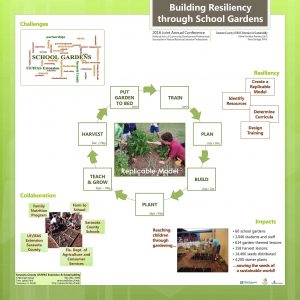Building Resiliency through School Gardens
M. Rometo, UF/IFAS Extension Sarasota County, Sarasota, FL
Sarasota County’s Comprehensive Plan encourages the use of county parks for community gardens to promote sustainable agriculture practices. However, four years ago, coordination and standards varied dramatically for each of the gardens which resulted in confusion and risk. New gardens also faced significant hurdles as they considered complex legal and governance issues.
As interest grew, the need for a cohesive program became apparent. In 2011, the University of Florida/Institute of Food and Agricultural Sciences Extension hired a dedicated Community and School Gardens Program Coordinator, the first of its kind in Florida. Over the next 18 months, Extension worked with municipal officials, non-profits and gardeners to develop and implement a consistent, positive model for the use of public lands as community gardens.
With the success of the Gardens Program, staff also endeavored to establish a replicable model for school gardens. Awareness in the value of growing your own food increased with the Healthy Hunger-Free Kids Act in 2010. Meanwhile, local interest in youth gardening increased and teachers struggled to find the necessary resources to establish school gardens.
Questions and concerns arose regarding funding, maintenance, construction and curricula. Extension took a multi-program approach working cooperatively with the Agriculture agent, 4-H, Family and Consumer Sciences, and Horticulture agents, along with the Family Nutrition Program (FNP), Master Gardeners, Florida Dept. of Agriculture and its regional Farm to School Coordinator. Additionally Extension collaborated with external stakeholders and community partners to find solutions.
This collaboration resulted in the creation of twenty-two new school gardens in Sarasota County since 2012. Partnership with FNP (SNAP-ED) doubled the amount of students reached with nutrition and gardening education. Through the Community and School Gardens Program Coordinator, input from agents, FNP funding and teaching from recognized curricula, Extension has successfully connected resources to community development.
(Click photo to enlarge.)
 0
0

